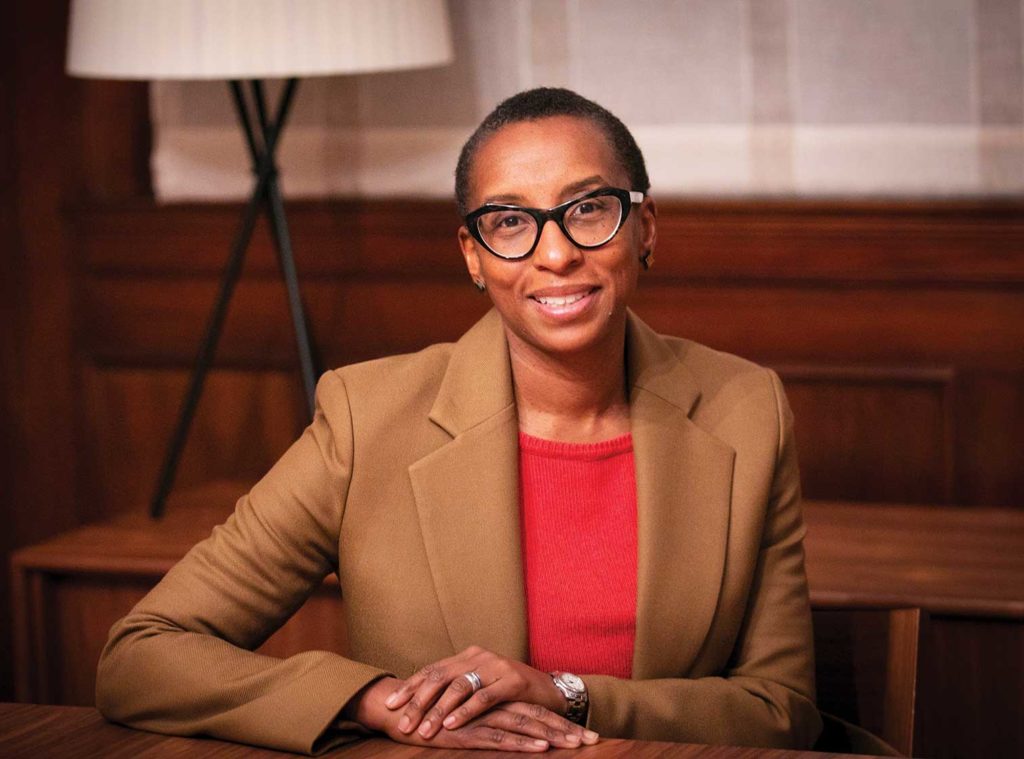Claudine Gay to head Harvard
Will become first African American to lead university

Claudine Gay, an acclaimed political scientist and proven administrator in the trench warfare of higher education, was elevated last week to the pinnacle of the ivory tower, becoming the first African American to lead Harvard University in the school’s fourth century of existence.
Gay, 52, the first-generation daughter of Haitian immigrants, will take over the president’s ivy-covered office in Massachusetts Hall next July after serving for the last four years as dean of the Faculty of Arts and Sciences, the largest division of Harvard’s sprawling academic empire.
During remarks on campus after the announcement went public, the woman who will become Harvard’s 30th president cut against the perception of academia as separate from the larger world, pledging to make Harvard a more vital player in the struggles shaping society.
“The idea of the ivory tower, that is the past, not the future, of academia,” she said. “We don’t exist outside of society, but as a part of it, and that means that Harvard has a duty to lean in and engage and be in service to the world.”
She takes the helm of the nation’s oldest university as Harvard, like campuses across the country, contends with legal battles over affirmative action, student protests around divestment, so-called cancel culture and diversity issues.
Gay will also oversee the execution of a $100 million investment plan announced under her predecessor, Lawrence Bacow, as a reparations measure linked to Harvard’s extensive ties to the slave trade, including Gay’s forebears in the Caribbean, where early New England traders, many of them Harvard benefactors, made fortunes off the merchandizing of human lives.
Henry Louis Gates Jr., the celebrity academic who heads up Harvard’s Hutchins Center for African & African American Research, called Gay’s appointment “a victory for diversity and excellence,” according to The New York Times.
“Claudine has proven herself a first-class academic leader as well as a rigorous scholar in her own right,” said Gates. “And under her leadership, Harvard will continue to be a model in upholding the highest standards of academic excellence, advancing the frontiers of knowledge while also advancing strategies of inclusion.”
Gay joined the Harvard faculty in 2006 as a professor of government and African American studies, focusing in her teaching and research on how the election of people of color to public office shapes citizens’ perception of government.
The second woman president at Harvard after Drew Gilpin Faust, Gay attended Stanford University after graduating from the elite Phillips Exeter Academy in New Hampshire and landed in Cambridge in 1992 to start her masters and doctoral studies.
In a slickly produced video announcing the appointment, in her campus remarks, and in student and faculty reactions, it was her backstory rather than her glittering academic resume that received the most attention.
“My parents are Haitian immigrants,” she said. “They came to the U.S. with very little and put themselves through college while raising our family. They believe that education made everything possible. Being an academic opened up my world and helped me achieve a dream I could never have imagined.”
Gay made clear she sees her new assignment as a welcoming sign to students who might not consider attending a college associated with elitism and privilege in snowy New England.
“As a woman of color, as a daughter of immigrants, if my presence in this role affirms someone’s sense of belonging at Harvard, that is a great honor,” she said. “And for those who are beyond our gates, if this prompts them to look anew at Harvard, to consider new possibilities for themselves and their futures — then my appointment will have meaning for me that goes beyond words.”
Gay’s parents met as students in New York City. Born and raised in her early years in the Bronx, she moved with her family to Saudi Arabia when her father, an engineer working for the U.S. Army Corps of Engineers, was posted to the Middle East. Her mother is a registered nurse.
She is married to Christopher Afendulis, a health care expert at Stanford.
Gay becomes the second Haitian American appointed to lead a major U.S. university, following the elevation last year of Reginald DesRoches as president of Rice University in Houston.
Reactions to Gay’s appointment among Harvard College students — who make up the biggest slice of the university’s academic pie — were almost uniformly positive, with some praising her rise while withholding final judgment until they see how she addresses key issues roiling the campus.
“To have Dean Gay serve as the next Harvard president is a massive success that is cause for celebration,” said Laeticia Allache, 20, who attended public schools in the Virginia suburbs of Washington, D.C., after moving to the U.S. with her Algerian family at the age of 4. “At the same time, I also hope that Dean Gay’s appointment is more than a symbolic gesture of inclusion and progress. The enduring issues that perpetuate systemic inequality at Harvard must be addressed.”
From slow plans on divestment, a lack of response on sexual violence, opposition to organized labor, Palestinian solidarity and unclear plans of reparations, Allache added that “there is a great deal of work to be done when it comes to rectifying Harvard’s wrongs.”
Carlos Watson, a Black Harvard alumnus from Miami who graduated just before Gay’s arrival in Cambridge, said her appointment represents a unique opportunity.
“As an alum and as a global citizen,” said the OZY media founder, “I am so excited to see this talented Black woman take on this role. There is such an opportunity to help Harvard boldly reimagine itself as we head deeper into the 21st century. From race to robots and from marriage to currency, so much is being reimagined throughout the world, and Harvard should be the catalyst for positive change. I hope President Gay will be strongly supported by students, faculty, alums and other stakeholders as she guides Harvard’s next chapter.”






